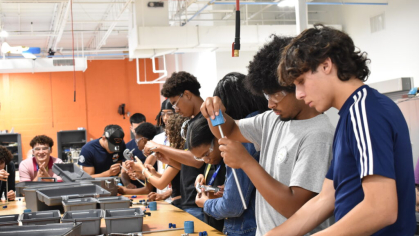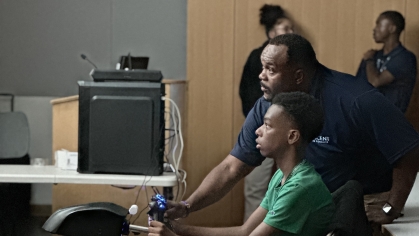Mandela Fellows Visit RU-N, Learn of Newark's Promise and Pain
With cameras flashing and eyes alert, 25 members of the Mandela Washington Fellowship arrived at Rutgers University–Newark (RU–N) for a crash course in Newark history, culture, policy, and civic engagement.
Hailing from 16 African countries, the fellows represent a generation of young civic leaders dedicated to improving their communities through programs that 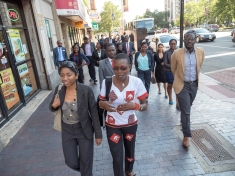
Their visit to RU–N is one of several stops during the fellows’ six-week stay in the United States, as they participate in courses, training, networking, and leadership opportunities designed to support their efforts in Africa. This is the second year that Rutgers, The State University of New Jersey, was selected as a partner with President Obama’s Mandela Washington Fellowship for Young African Leaders initiative, which hosts 500 of Africa’s most promising leaders ages 25 to 35 through a network of 20 universities in the United States.
“I see this visit as an important start of a dialogue that [this university] might have with this group of rising African leaders,” said Kyle Farmbry, acting dean of the Graduate School at RU–N. “I’m hoping that we will have some opportunities to explore partnerships and ways that we can collaborate with them in the future.”
The Mandela fellows’ introduction to Newark began with a panel featuring Roland Anglin, director of the Joseph C. Cornwall Center for Metropolitan Studies at RU–N; Linwood Oglesby, executive director of the Newark Arts Council; and Carmelo Garcia, New Jersey assemblyman and executive vice president of the Newark Community Economic Development Corporation. The panelists addressed arts and culture, education, and economic development in the city, creating a “tale of two cities” narrative for its visitors as they discussed Newark’s robust arts scene and thriving business sector, coupled with high rates of poverty and educational disparities.
“We have more than 3,800 young people, ages 16 to 24, who are not attached to any formal system of learning. The reasons are myriad, but the fact is, they are not,” said Anglin. Anglin explained that a concerted effort is under way to address this challenge through the Newark City of Learning Collaborative, an initiative that aims to lower Anglin’s statistic by increasing the number of Newark residents with postsecondary degrees from 17 percent to 25 percent by 2025.
Hands shot in the air as the fellows asked incisive questions about educational systems, the role of the arts in community outreach, political advocacy, and the need for youth empowerment, drawing parallels between Newark and their own communities in Africa.
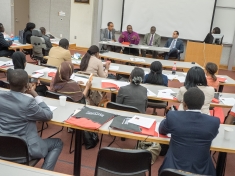
Special education advocate Faith Njahira said that the discussion inspired her, and that she’d want to return to RU–N if given the chance to further explore policies for people with disabilities.
“I was hoping to learn about issues of social justice and advocacy in Newark, and how we can apply the same [strategies], because I’m in disability advocacy and we need policies, we need the right policies toward social change,” said Njahira. “An [inclusive educational system] is something that we’re really trying hard in Kenya to move toward, and I learned that here it’s a priority.”
Glen Mbah, who works as a childhood cancer program manager, said that he now sees Newark as a promising model of success through artistic collaboration.
“Back in my country in Cameroon, we have musicians coming together, [graphic artists] coming together, and journalists coming together, but it is not easy to keep them together. We always have issues of splitting and power struggles among the organizations,” he said.
Mbah continued, “It’s amazing to see that the [Newark Arts Council] has lasted since 1981. It’s amazing, and something that has to be passed to other cultures, especially considering that Newark is so culturally diverse. I think that if this [collaborative model] spreads to other parts of the diaspora, especially African countries where we believe we have a lot of artistic talent, putting these talents together can go a long way to develop the economy of our cities back home.”
Later in the day, the fellows took a bus tour led by Marcia Brown, RU–N vice chancellor for external and governmental relations, who promised to show them “a city of contrast, a city of tradition, and a city of struggle.”
The bus weaved throughout Newark, past famous landmarks, government buildings, local colleges, hospitals, and businesses. The fellows also saw residential areas, including the Newark Fairmount Promise Neighborhood, a community identified by RU–N and community partners for its high concentration of crime and poverty, and targeted to provide its youth with access to better educational opportunities and community support.
The tour concluded with a stop to Newark City Hall, where Mayor Ras J. Baraka surprised the fellows with an impromptu question-and-answer session to explain 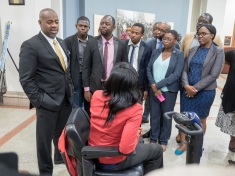
For Zambian agronomist Lungowe Situmbeko, the visit to RU–N was an unexpected and welcome educational experience. “I think someone said it best when they were describing Newark as a tale of two cities, because there are so many new and promising things coming up, but then there’s also a stark contrast with the old areas and poverty really in your face in some places. It’s interesting that there’s such a contrast,” Situmbeko said.
Photos by Shelley Kusnetz.
